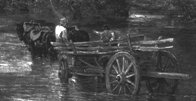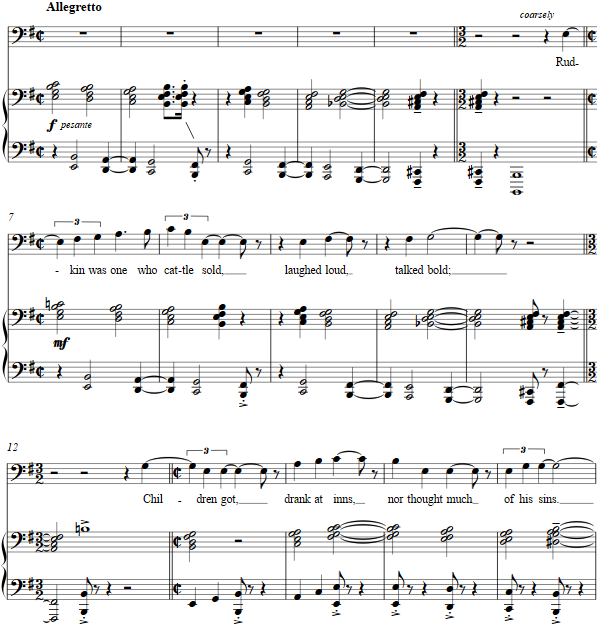Music and Texts of GARY BACHLUND
Vocal Music | Piano | Organ | Chamber Music | Orchestral | Articles and Commentary | Poems and Stories | Miscellany | FAQs
Rudkin - (2018)
Kenneth H. Ashley
for baritone or bass and piano
Rudkin was one who cattle sold,
Laughed loud, talked bold;
Children got, drank at inns,
Nor thought much of his sins.
Stout his legs, broad his back;
To live and thrive he had the knack.
All who went out, all who came in,
By Threckington, knew stout Rudkin.
Long he's been dead; his name has gone
Clean out of mind at Threckington;
If one should ask for Rudkin there
The village folk would stare and stare.
Rudkin is dead; dead as Queen Anne:
Hangs on my wall his warming-pan;
In hall hard by, solemn and clear,
Ticks the tall clock he used to hear;
Little Miss Wright, all unaware,
Reads her paper in his chair.
Down by the bridge the parapet
Is still chipped where his wain upset;
By the old barn there's an old pear
When he was wed he planted there.
His drover's dog was very like
Our butcher's cur: a mongrel tyke;
He had a bull with a crooked horn,
A heifer like it I saw this morn.
Down at "The George" in market-place
There's a bold wench wears his bold face.5 pages, circa 4' 30"
Little is know of the English poet, novelist, journalist, and a farmer, Kenneth Herbert Ashley, born in 1887. This obituary in rhyme was included in The Best Poems of 1923, edited by Leonard A.G. Strong. Though little is known of him, he apparently published a poetry collection, Up Hill and Down Dales (n. d.), two novels, Creighton the Admirable (n. d.) and Death of a Curate (n. d.) and was a contributor to The London Mercury (one of a number of periodicals with the same name to have come and gone over several centuries), The Spectator (published since 1828), and The Athenaeum (published from 1828 to 1921). The conceit of the poem with its reference to a fictional town (bearing the memory of an earlier Threckington Manor) tells of a character remembered in the everyday roles, small events and little things of his life, echoing after Rudkin's death into a future as recalled by the narrator.
The image above, detail from Constable's The Hay Wain (1821) shows the large cart drawn into water, possibly to refresh the team and cool the metal rims of wooden wheels which would otherwise separate. Rudkin's wain was overturned, as we also learn in his farmer's life "to live and thrive he had the knack" Enough to be remembered so.
Marked pesante in the accompaniment and "coarsely" for the singer, the setting is intended to convey the rude and lurching scansion of the poem and its central character.
The score is available as a free PDF download, though any major commercial performance or recording of the work is prohibited without prior arrangement with the composer. Click on the graphic below for this art song score.

